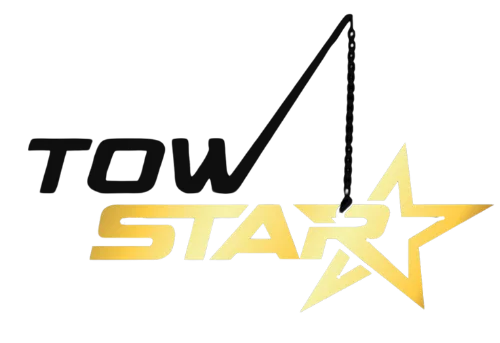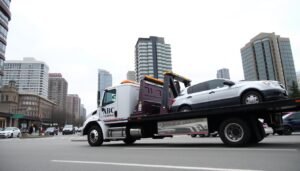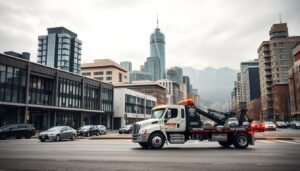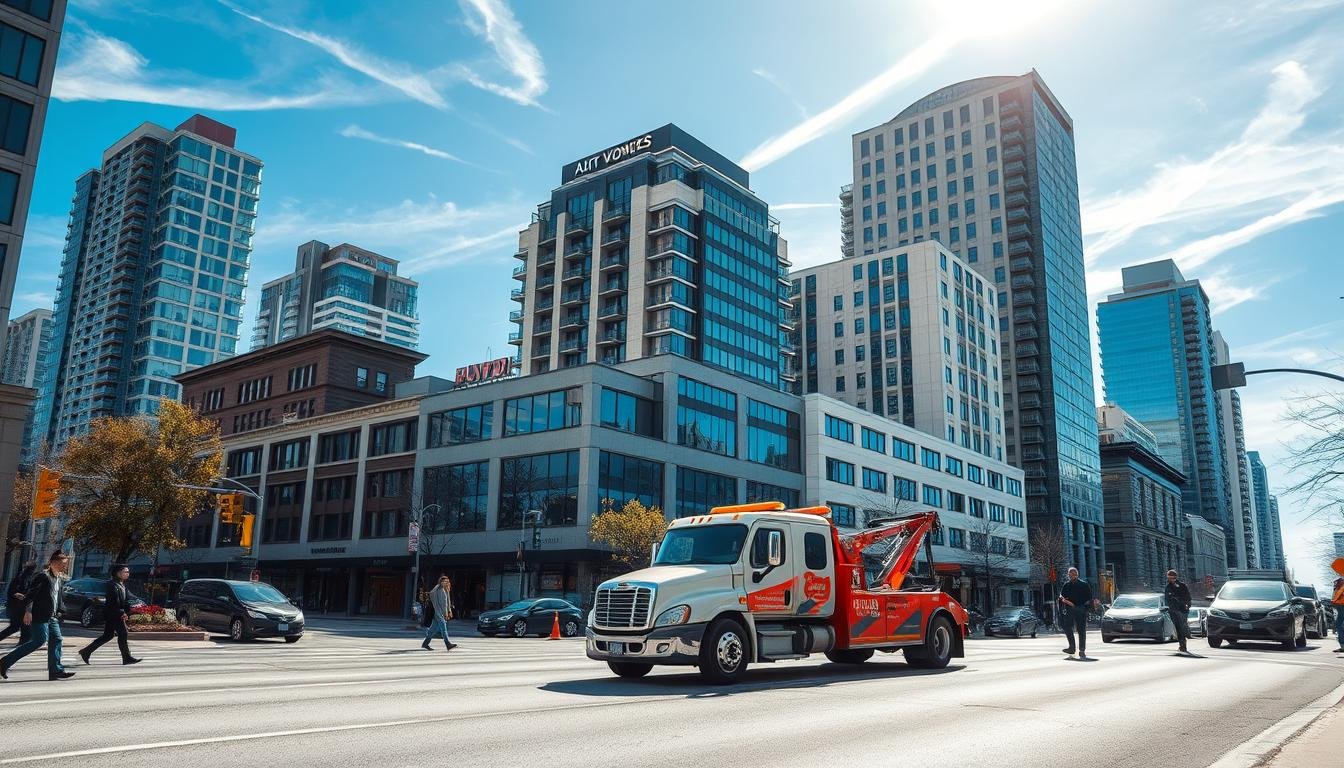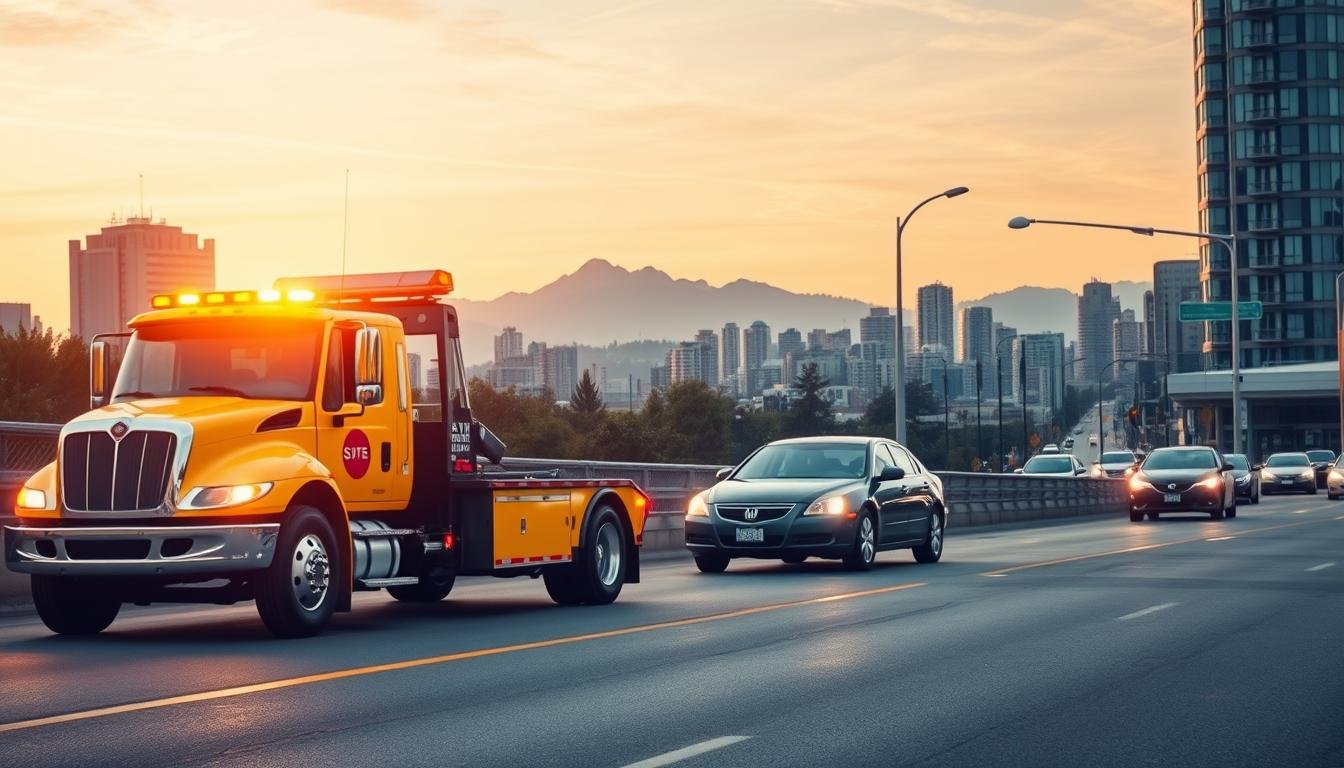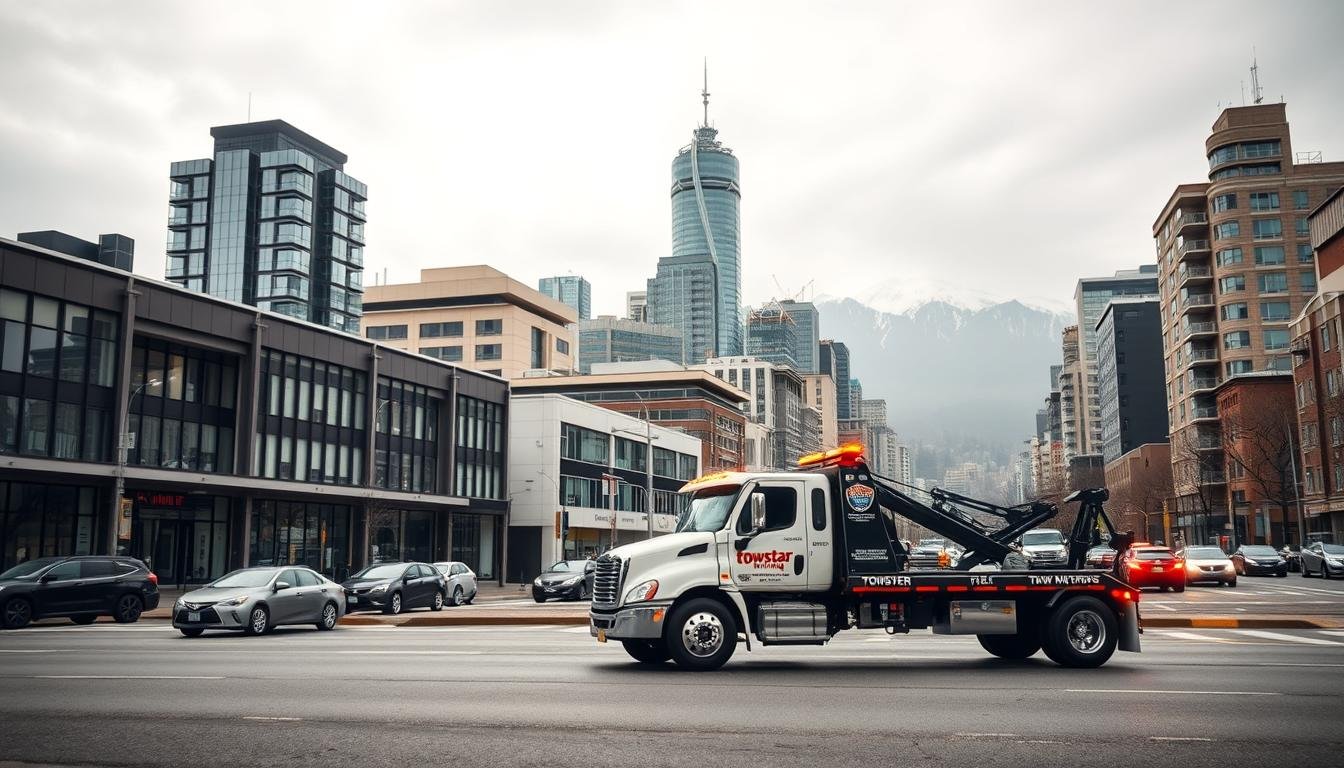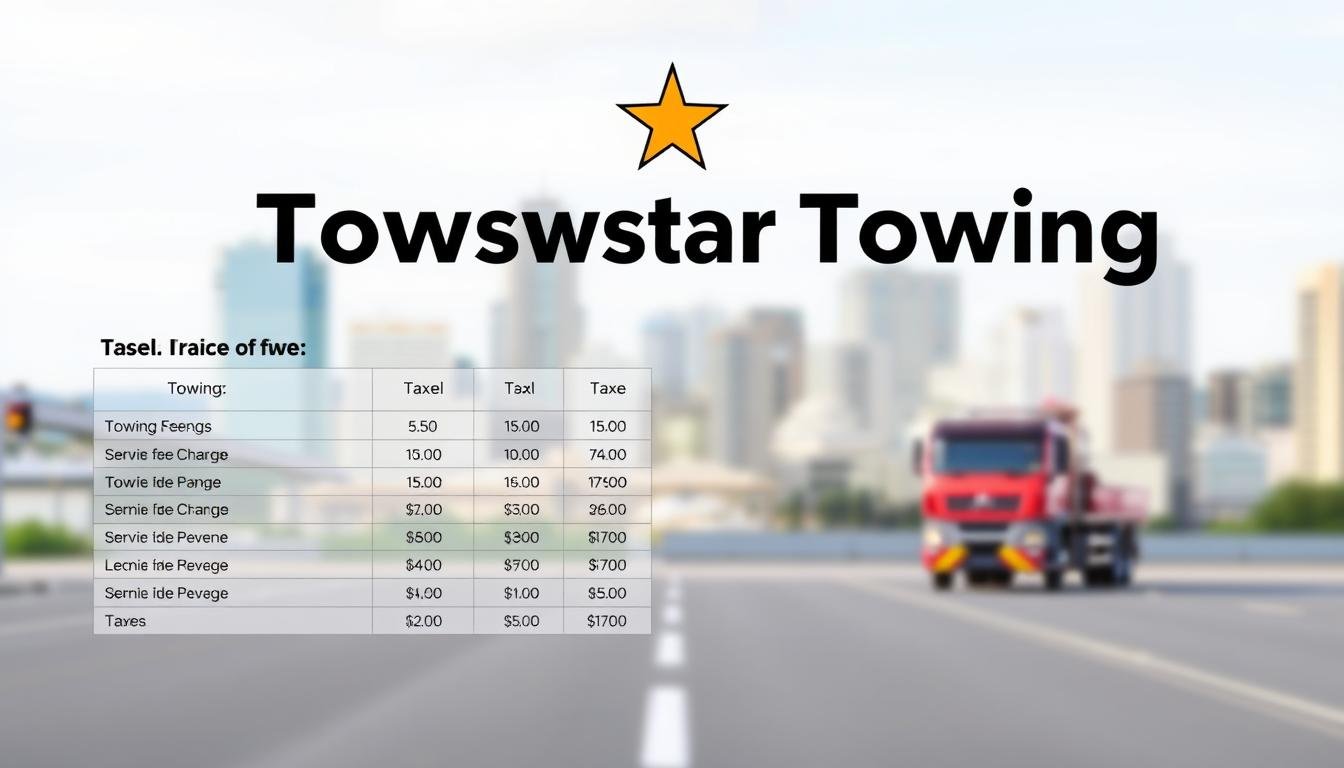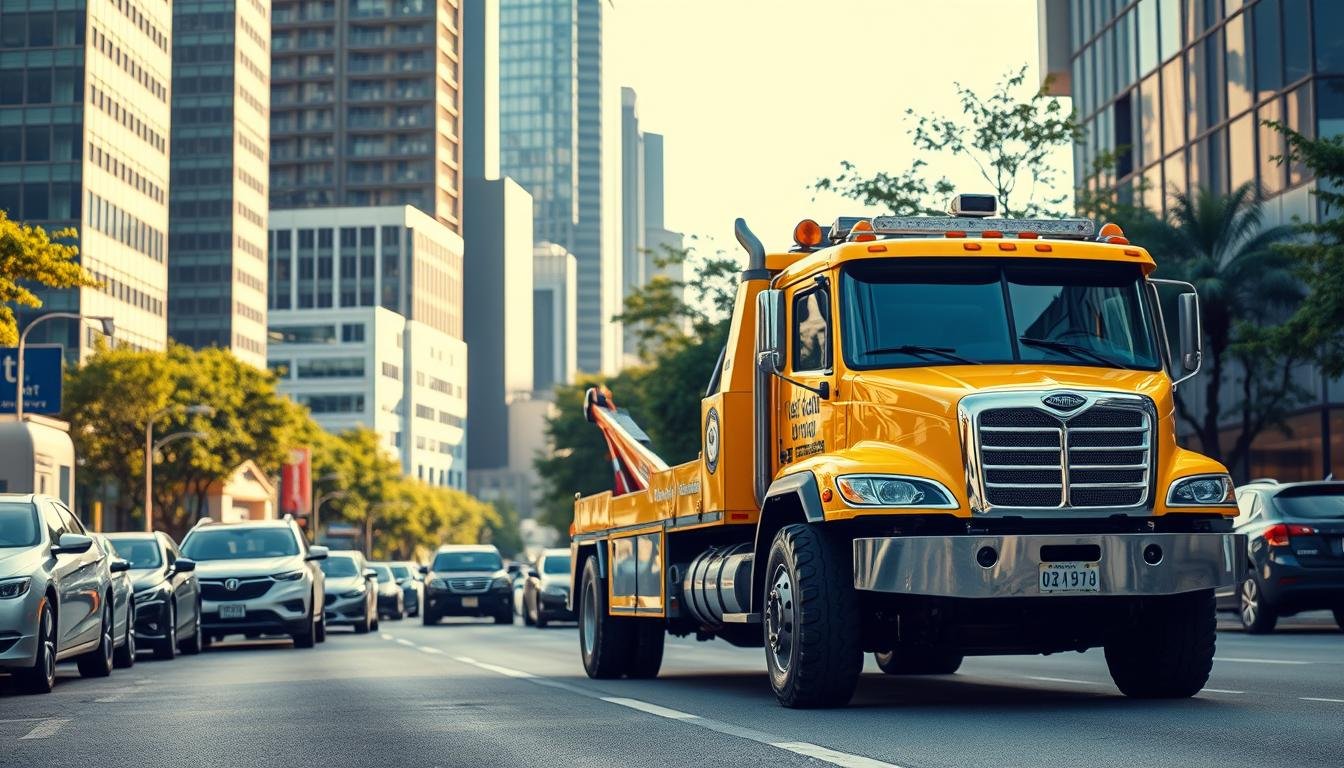Did you know towing private property is common in Vancouver? It shows the city’s strict parking rule. As a car owner, knowing these rules helps avoid trouble. A Vancouver tow truck company can help with towing on private property. It’s important to know the city’s bylaws for towing to make the process smooth.
In Vancouver, only licensed companies and property owners can tow cars. If you own property, you can use a towing service in Vancouver to enforce parking rules. The towing process can seem complex, but with the right help, it’s manageable.
As a car owner, knowing the towing rules in Vancouver is key to avoiding problems. A trusted Vancouver tow truck company can assist you. The city requires clear towing signs that meet specific size, wording, and placement criteria. Additionally, it’s important to be aware of designated towing zones and the hours during which towing is enforced. Failure to comply with these regulations can lead to fines and the inconvenience of retrieving your vehicle from impound. For reliable and compliant towing services in Vancouver, make sure to choose a company that is well-versed in local laws and provides transparent pricing.
Key Takeaways
- You should be aware of the regulations surrounding private property towing in Vancouver to avoid any issues.
- Only licensed towing companies and property owners are authorized to tow vehicles from private property in Vancouver.
- The city has specific bylaws governing private property impound, and it’s essential to understand these rules to ensure a smooth process.
- You can work with a towing service Vancouver to enforce your parking rules.
- The Vancouver private property impound process can be complex, but with the right guidance, you can navigate it easily.
- Towing companies in Vancouver must adhere to strict laws and regulations to operate legally in the city.
- Towing fees for regular-sized cars in Vancouver typically consist of a base fee and additional charges for mileage and storage3.
Understanding Private Property Towing in Vancouver
If you own a vehicle in Vancouver, it’s important to know the towing rules. Private property towing means a vehicle is taken away without the owner’s okay. This is done by a towing company hired by the property owner or manager. ICBC helps by setting rules for towing companies.
In Vancouver, towing rules are set by the City’s bylaws. These rules cover things like signage, how to notify owners, and where to store vehicles. Knowing these rules can prevent problems. For example, towing permits in Richmond are only good for 2 years. That said, to better understand towing services in Vancouver, BC, check out our full guide.
Here are some key points to consider:
- Private property towing has its own set of rules and guidelines.
- ICBC towing policies and Vancouver towing bylaws control the towing process.
- Knowing these rules can help you avoid problems and make towing smoother.
To learn more about towing in Vancouver, including costs and rules, talk to a trusted towing company or check the City of Vancouver’s website. Always follow the rules to avoid any trouble.

Vancouver’s Towing Laws and Regulations
If you own a vehicle in Vancouver, you need to know the towing laws. These rules help protect both property and vehicle owners. They make sure towing is done fairly and legally.
Property owners can have vehicles towed if they’re parked without permission. But, they must give the vehicle owner proper notice. Tenant rights are also protected, with clear rules for towing from rental properties. Towing companies must follow the right steps and charge fairly.
Important things to remember about Vancouver’s towing laws include:
- Bylaws for towing from private property, explaining the steps to take
- Rules for property and tenant rights, covered by the Residential Tenancy Branch
- What towing companies must do, like following procedures and charging fairly
Knowing these rules helps avoid problems. For more details, visit the City of Vancouver’s website. The Residential Tenancy Branch and Consumer Protection BC also offer advice on rights and responsibilities.
Signs and Notifications for Private Property Towing
In Vancouver, proper signage is key for private property towing. You must tell vehicle owners about towing policies and procedures. Towing signs must be clear and show the towing rules. It’s also important to have good notification procedures to avoid disputes and keep owners informed.
ICBC says you must notify owners before towing. You can do this by posting signs with towing policies. Sending a notice to the owner before towing is also a good idea. This way, everyone knows what’s happening.
Clear communication is vital to avoid conflicts. By following ICBC guidelines and using the right signs, you can keep owners informed. This makes towing fair and clear for everyone.
Here are some tips for signs and notifications for private property towing:
- Use clear and visible towing signs that indicate the signage requirements for private property towing
- Follow ICBC best practices for notifying vehicle owners before towing
- Use clear communication to prevent disputes between property owners, towing companies, and vehicle owners
Tips for Property Owners to Enforce Towing Policies
As a property owner, you must set clear towing policies to protect your property. Make sure vehicle owners know the rules. Choose a reliable towing company like Towstar Towing & Recovery to help. It’s important to have clear parking rules and signs that show parking restrictions and what happens if rules are broken.
It’s key to document violations before towing to avoid disputes and ensure a smooth towing process. Use procedures to record parking violations, like photos and witness statements. These steps help keep your parking area safe and organized.
Some important things for property owners to remember include:
- Setting clear parking rules and regulations
- Picking a trustworthy towing company
- Recording violations before towing
- Providing clear signs and notices to drivers
By following these tips and working with a good towing company, you can enforce your towing policies and protect your property.
Clear communication and documentation are vital to avoid disputes and ensure towing goes smoothly. Working with your tenants, visitors, and towing company helps keep your parking area safe and orderly.
What to Do If Your Vehicle is Towed
If your vehicle is towed, knowing what to do next is key. Start by calling the Vancouver Parking Authority to see if they have your car. They can tell you where it is. Also, remember that towing fees in Vancouver will change on January 1, 2025. The cost of towing a regular car, pickup, or van will be $82.18 or more.
It’s essential to know your rights after a tow. Consumer Protection BC can help with this. Also, be aware that storage fees for your vehicle will be between $25.18 and $75.54 per day, based on its size. To get your car back, follow ICBC’s advice. This includes contacting the towing company and showing proof of ownership.
Here are some key steps to take if your vehicle is towed:
- Contact the Vancouver Parking Authority to find out where your vehicle is being held
- Understand your rights after a tow with the help of Consumer Protection BC
- Follow the steps recommended by ICBC to retrieve your vehicle
Preventing Private Property Towing Issues
To avoid private property towing issues, follow good parking etiquette. This means respecting designated parking spaces and not overstaying your welcome. It’s also important to work together with property owners and tenants. This helps set clear parking rules and guidelines. Knowing the cost of towing can also guide your parking choices and save you money.
Some ways to prevent private property towing issues include:
- Respecting parking signs and restrictions
- Not parking in designated no-parking areas
- Being mindful of parking time limits
- Collaborating with property owners and tenants to establish clear parking rules
By following these tips and understanding towing costs, you can avoid towing issues. This saves you from stress and extra expenses. Always be respectful of others’ property and follow the rules.
For more information, talk to a reliable towing company like Towstar Towing and Recovery today. They offer 24/7 service and work closely with strata properties in Vancouver. They can help you set up clear parking rules and explain towing costs.
Choosing a Reliable Towing Service in Vancouver
Choosing a trustworthy towing service requires careful consideration. Look for companies with positive reviews, transparent pricing, and 24/7 availability. Verify licensing and certifications to ensure compliance with Vancouver’s regulations. Local options like Towstar Towing and Recovery stand out for their reliability and quick response times, making them a top choice.
FAQs
If you own a vehicle in Vancouver, you might wonder about towing on private property. Here are answers to common questions. You’ll learn about towing signs, your rights, and fees in disputes between tenants and landlords. Vancouver has specific regulations regarding when to call a tow truck, and knowing these can help prevent misunderstandings. It’s essential to ensure that proper signage is displayed on the property and that you’re aware of the rules surrounding parking enforcement. Understanding your rights as a vehicle owner will also help you navigate any disputes with landlords or property managers effectively. It’s important to understand the regulations surrounding towing to avoid potential conflicts and ensure your vehicle is not unlawfully removed. In case you encounter a situation where your vehicle is improperly towed, knowing your rights can empower you to challenge any fees or penalties. For those seeking assistance with such matters, there are numerous emergency towing services in Vancouver that can help address towing issues promptly and effectively. When parking your vehicle, it’s important to look for clear towing signs, as these indicate whether your car is subject to towing and any associated fees. Additionally, understanding your rights as a tenant or homeowner can prevent misunderstandings with property owners. If you happen to experience car breakdown causes in Vancouver, be sure to check your local regulations on towing to protect yourself from unnecessary fines.
It’s important to know about towing signs. The law requires property owners to post clear signs about towing. As a car owner, you should know your rights if your car is towed. You can dispute the tow and get your vehicle back.
In cases of tenant-landlord disputes, who pays for towing fees can be unclear. But usually, the one who asked for the tow pays. Here are some key points to remember:
- Proper towing signage is required by law.
- Vehicle owners have the right to dispute a tow and retrieve their vehicle.
- The party that requested the tow is generally responsible for the fees.
Understanding your rights and responsibilities is key when it comes to towing in Vancouver. Knowing the rules helps avoid problems and ensures a smooth process if your car is towed. For more info, check out FAQs, towing signs, vehicle owner rights, towing fees, and tenant-landlord disputes.
Always check the towing signs and know your rights as a car owner. If you have more questions, feel free to ask.
Conclusion
Understanding private property towing in Vancouver is key. Knowing the towing rules and your rights as a car owner is vital. Property owners must also follow the law when towing vehicles. This way, everyone can avoid unnecessary towing costs and ensure vehicles are handled with care.
Private property towing in Vancouver has strict rules. These include needing proper signs and notifying car owners before towing. Knowing these rules helps avoid problems and makes towing smoother if it’s needed.
For property owners, setting clear parking rules is important. Working with trustworthy towing companies that follow the law is also key. This keeps good relations with tenants and visitors. It also makes sure towing is done right and with respect. Following Vancouver’s bylaws, like those for commercial vehicles and parking zones17, helps avoid disputes and keeps things legal.
In short, private property towing in Vancouver needs a good grasp of the rules. It also requires respect for car owners and responsible towing practices by property owners. Being well-informed and taking the right steps helps you deal with towing confidently. This way, your rights are protected, and towing is fair and efficient.
FAQ
What is private property towing in Vancouver?
In Vancouver, private property towing means removing a vehicle without the owner’s okay. This is done by a towing company hired by the property owner or manager.
Can a vehicle be towed without proper signage in Vancouver?
No, the City of Vancouver bylaws say a vehicle can’t be towed without clear signs. These signs must be visible and meet certain standards.
What are my rights if my car is towed from private property?
If your car is towed, you have the right to know why and where it was taken. You also have the right to dispute the towing if you think it was unfair.
Who is responsible for towing fees in a tenant-landlord dispute?
In a tenant-landlord dispute, who pays for towing fees depends on the tenancy agreement. Usually, the property owner pays, but they might try to get the tenant to pay.
How do I find out if my car was towed in Vancouver?
If you think your car was towed in Vancouver, contact the Vancouver Parking Authority or the towing company. They can tell you if your car was towed and how to get it back.
What are the steps to retrieve my vehicle if it was towed?
To get your vehicle back, contact the towing company and show proof of ownership. You’ll also need to pay any towing and storage fees before it’s released.
How can I prevent my vehicle from being towed on private property?
To avoid towing, park in designated areas and follow posted signs. Don’t park in “no parking” or “tow-away” zones.
What are the consequences of illegal towing in Vancouver?
Illegal towing in Vancouver can lead to fines and damages for the towing company and property owner. Always follow towing regulations to avoid trouble.
What is the role of ICBC in private property towing?
ICBC sets guidelines for towing in Vancouver. They also help vehicle owners who have been towed and are trying to get their cars back.
How can I choose a reliable towing company in Vancouver?
Look for a towing company that is licensed, insured, and has good reviews. Being a member of the Towing and Recovery Association of British Columbia is a plus.
